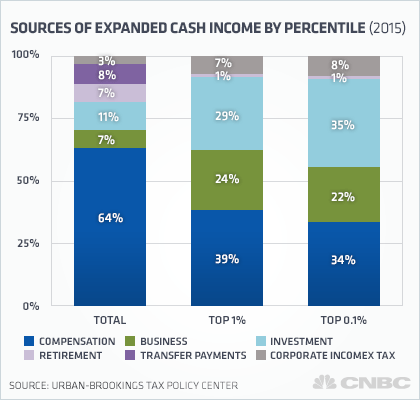Tuesday, August 13, 2013
Where the wealthy get their income
Published: Tuesday, 13 Aug 2013 | 10:43 AM ET

By: Robert Frank | CNBC Reporter and Editor
Much of the debate over taxing the wealthy focuses on taxing giant salaries.
But a new study from the nonpartisan Tax Policy Center found that the real money for the wealthy is made from investments and business income—not compensation.
The paper, from Joseph Rosenberg, takes a broader definition of income. The so-called "Expanded Cash Income" includes retirement and health-care benefits, retirement income, tax-exempt interest and other add-ons aimed at providing a more accurate picture of the nation's income distribution.
But a new study from the nonpartisan Tax Policy Center found that the real money for the wealthy is made from investments and business income—not compensation.
The paper, from Joseph Rosenberg, takes a broader definition of income. The so-called "Expanded Cash Income" includes retirement and health-care benefits, retirement income, tax-exempt interest and other add-ons aimed at providing a more accurate picture of the nation's income distribution.

The results show a stark contrast between
the 1 percent and the rest. The population as a whole earns 64 percent
of its expanded cash income from so-called "compensation," basically a
paycheck from a company. But the top 1 percent earns only 39 percent
from compensation. It gets 24 percent from business income and 29
percent from investments.
The top 0.1 percent is even more reliant on investments, with 35 percent of their income from investments.
In other words, the richer you are, the more likely you'll make your money from investing or owning a business.
The top 0.1 percent is even more reliant on investments, with 35 percent of their income from investments.
In other words, the richer you are, the more likely you'll make your money from investing or owning a business.
As Jared Bernstein of the Center on
Budget and Policy Priorities points out, "Once you get up to the very
top of the income scale ... you've got two-thirds of their income coming
from nonlabor sources."
(Read more: Meet the new wealthy: The cash hoarders)
That's not to imply that the wealthy are just living off passive income, or that they're not working as hard as the everyday America. Business owners, in fact, often work longer hours than full-time employees.
"When we think about small business owners, these are 24-7 people and they can be working harder than you or me," said Roberton Williams of the Tax Policy Center. He said there is little correlation between the type of income people receive and their level of work.
(Read more: Yes, the rich are different: They don't retire)
Indeed, economist Emmanuel Saez of the University of California at Berkeley writes that since the 1970s, the rising incomes of the wealthy are due largely to a growth in their wages and salary income.
"The evidence suggests that top income earners today are not 'rentiers' deriving their incomes from past wealth but rather the 'working rich."'
Of course, working might also mean "owning."
(Read more: Meet the new wealthy: The cash hoarders)
That's not to imply that the wealthy are just living off passive income, or that they're not working as hard as the everyday America. Business owners, in fact, often work longer hours than full-time employees.
"When we think about small business owners, these are 24-7 people and they can be working harder than you or me," said Roberton Williams of the Tax Policy Center. He said there is little correlation between the type of income people receive and their level of work.
(Read more: Yes, the rich are different: They don't retire)
Indeed, economist Emmanuel Saez of the University of California at Berkeley writes that since the 1970s, the rising incomes of the wealthy are due largely to a growth in their wages and salary income.
"The evidence suggests that top income earners today are not 'rentiers' deriving their incomes from past wealth but rather the 'working rich."'
Of course, working might also mean "owning."
—By CNBC's Robert Frank. Follow him on Twitter
@robtfrank.



0 comments:
Post a Comment